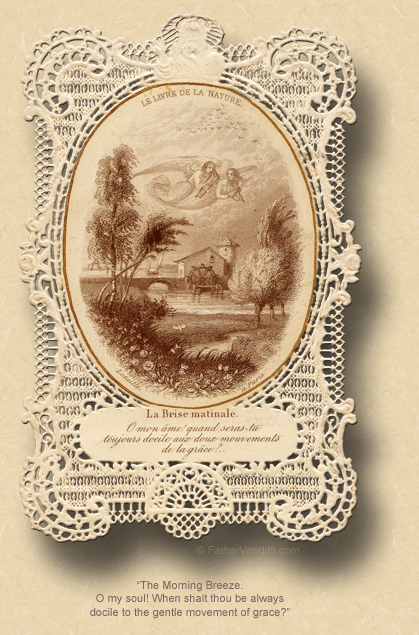Not Finding, but Being Found.
The Memorial of Saint Ignatius of Loyola, Priest.*
Lessons from the primary feria for the Seventeenth Wednesday of Ordinary Time, according to the ordinary form of the Roman Rite:
• Exodus 34: 29-35.
• Psalm 99: 5-7, 9.
• Matthew 13: 44-46.
|
…or, from the proper:
• I Corinthians 10: 31—11: 1.
• Psalm 34: 2-11.
• Luke 14: 25-33.
…or, any lessons from the common of Pastors, or the common of Holy Men & Women for Religious.
|
The Third Class Feast of Saint Ignatius of Loyola, Confessor.*
Lessons from the proper, according to the extraordinary form of the Roman Rite:
• II Timothy 2: 8-10; 3: 10-12.
• Psalm 91: 13-14.
• Luke 10: 1-9.
FatherVenditti.com
|
 6:05 PM 7/31/2019 — All this week, it seems, we’ve been treated by our Lord to a series of analogies to the Kingdom of God: the Wheat and the Weeds, the Mustard Seed, the Yeast, all presented by Our Lord as images of the Kingdom of Heaven, and all of which seem very simple and straight forward. Today’s very brief Gospel lesson gives us two more: a treasure buried in a field, and “the pearl of great price”; and, over the centuries they’ve been traditionally used to express the need to accept the will of God and perform the duties of our state in life. The treasure signifies the grace that one receives along with his vocation, whether it’s the grace of fidelity as given in the sacrament of Matrimony, or the grace to guide, teach and sanctify as given in the Holy Priesthood; while the pearl signifies the great beauty and splendor of the call. 6:05 PM 7/31/2019 — All this week, it seems, we’ve been treated by our Lord to a series of analogies to the Kingdom of God: the Wheat and the Weeds, the Mustard Seed, the Yeast, all presented by Our Lord as images of the Kingdom of Heaven, and all of which seem very simple and straight forward. Today’s very brief Gospel lesson gives us two more: a treasure buried in a field, and “the pearl of great price”; and, over the centuries they’ve been traditionally used to express the need to accept the will of God and perform the duties of our state in life. The treasure signifies the grace that one receives along with his vocation, whether it’s the grace of fidelity as given in the sacrament of Matrimony, or the grace to guide, teach and sanctify as given in the Holy Priesthood; while the pearl signifies the great beauty and splendor of the call.
But it’s interesting to note that there is a key difference between the two parables: the discovery of the pearl presupposes a great amount of effort in searching, while the treasure buried in the field seems to have been discovered almost by accident. And is this not exactly how it is with our Blessed Lord? He calls people. Many find their vocation without looking, while others seem restless in their search to discover what it is God is ultimately asking of them in this life. What the two parables have in common is the fact that, in both cases, the individuals involved sold everything they had in order to obtain what they had found.
Today’s saint, Ignatius of Loyola, was a soldier who, while recuperating from a wound, read the lives of the saints, and was motivated to seek an entirely new vocation. He wasn’t looking for it; it found him. Maybe that’s the answer: sometimes the harder we look the more difficult things are to see; whereas, if we just go about our daily duties the best way we know how, God will reveal Himself to us in His own way and in His own time.
Let’s ask our Blessed Lord to grant us the grace of not only being disposed to His holy will, but also the grace to be patient enough to wait for it.

* A celebrated courtier and knight, Ignatius was wounded at the siege of Pamplona. During his long convalescence, the reading of the lives of the saints revealed to him that the Church militant needed an army of glorious soldiers to fight the forces combined against it: pagans, Mohammedans, Protestants, etc. He founded the Company of Jesus, known today as the Society of Jesus or the "Jesuits"; and, as first General of this new spiritual chivalry, he moved to the attack under the motto Ad majórem Dei glóriam—"To the greater Glory of God!" He died with the Holy Name of Jesus on his lips in the year 1556.
At the time of their founding, the Jesuits were unique among the mendicant orders in that, in addition to the three usual vows of poverty, chastity and obedience, they took a fourth vow of complete and slavish obedience to the will of the Pope. The provision in the Jesuit rule that no Jesuit should ever accept appointment as a bishop has been largely ignored in recent years, along with many other original charisms of the community as founded by Ignatius. Toward the end of the counter-reformation, the Jesuits became so powerful in the Church that their General Superior was often referred to as "The Black Pope" (referring to the black wrap-around cassock that served as their habit), a development that would have scandalized their holy founder.
|

